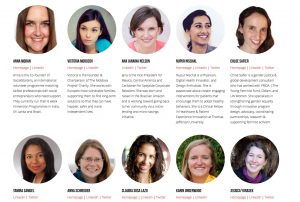There will definitely be a time in your life when you’ll feel lost, unsure about your career, have doubts or struggles making a decision. And if a couple of years ago we would approach parents, colleagues, friends or teachers, now we have other great options, we can get professional help from coaches, mentors, consultants or career counsellors. Those specialists are qualified to help us grow professionally and take the best decisions according to our abilities and dreams. Today I would like to share about coaching and how it can impact on your professional life.
Why coaching?
In 2016 I did a coaching fellowship program which still has a great impact on my professional and personal life. It helped me find a deeper understanding of the impact I want to make in this world: to help vulnerable people change their lives. But the thing I loved most about it was that I was never given any advice or answers. The coach asked me lots of great questions to help me find the answers for myself. Of course, most of the time I wasn’t feeling comfortable with his questions; lots of them I didn’t want to speak about, or felt like I didn’t know what to say. It was actually an amazing challenge because it gave me the opportunity to explore my personality and thoughts from a different perspective. Then I had the choice to either change my perspective, or make the new perspective work for me.

Let’s start with, what is a coach?
A coach is NOT the same as a mentor, career counsellor or a psychotherapist.
A mentor/consultant will set out to train or give you direct advice in support of the professional goal or project you are attempting to accomplish. A career counsellor will help you to hone professional development skills such as creating a resume or cover letter, and give you direction on your career path.
Counselling is closer to a therapeutic intervention. It focuses on the past, helping the individual to overcome barriers and issues from their past and move on. Here, the focus may be either internal or external.
A coach, on the other hand, will work with you to reach your personal and professional goals. Coaching is more of an inner journey. Your coach never gives you advice or answers, but rather asks you questions to support you in finding answers for yourself. Actually, coaches believe you already have all the answers you need. They will be your mirror to keep you honest and a sounding board for ideas you wouldn’t share widely. Coaches work with you as a whole person. They know you are the same person when you go to work and when you return home. They work with you holistically because they know that something going on at home might be holding you back at work, and vice versa. They will enable you to grow, motivate you and hold you accountable to your goals. Coaching is unlocking a person’s potential to maximise their own performance. Perhaps most importantly, a coach is someone you don’t have a prior relationship with. It’s rare to have a completely neutral person in your life who won’t judge you for any actions, decisions or thoughts. In many ways, you might not be able to get this from a family member, friend or colleague.
The differences between these various ‘learning methods’ can be summarised as:
| Learning Method: | Coaching | Mentoring | Counselling |
| The Question: | How? | What? | Why? |
| The Focus: | The present | The future | The past |
| Aim: | Improving skills | Developing and committing to learning goals | Overcoming psychological barriers |
| Objective: | Raising competence | Opening horizons | Building self-understanding |
Read more at: https://www.skillsyouneed.com/learn/coaching.html
If you decide to apply for a coaching program you should be:
- Strongly committed
- Dedicated to your own self-discovery and development
- Willing to speak freely about both, difficulties and triumphs
- Realistic about your goals for coaching (feasible for completion within a few months’ time period)
- Clear on what you can expect from coaching
- Open to being challenged by a coach to explore outside of your comfort zone
- Willing to give your coach feedback on your coaching conversation and relationship
Here’s a helpful chart to further clarify what a coach is:
| Your coach will: | Your coach will NOT: |
|
|
It’s not a shame to ask for help when you feel stuck, weak, uncertain, down. Maybe you want a change but have no idea if you should really do it, or maybe you need to prioritise the family at this point? Questions and doubts are always in our mind and we can’t always seem to find the best answers. There will definitely be moments like this in our lives and I think we are extremely lucky that there are professionals who could help us find the right path that would bring us to happiness, make us successful and confident with our decisions. Do not waste your time with doubts and struggles that are only in your head and can be solved today! When needed, I choose to ask for help from specialists not family or friends, and this helps me become stronger. Coaching programs are amazing, of course if you manage to match with the right coach for you!
- Remember:
The best coaching advice it’s not going to come from the coach – it’s going to come from you! - Look to the present
- The great Western disease of “I will be happy when …” is sweeping the world. You know the symptoms. You start thinking: I will be happy when I get that … that promotion … that status … that money. The only way to cure the disease is to find happiness and meaning now.
- Give it a try and follow your dreams
People who try to achieve their dreams are happier with their lives. None of us will ever achieve all of our dreams. If we do, we will just make up new ones! If we go for it, we can at least say at the end, “I tried!” instead of, “Why didn’t I at least try?”.




